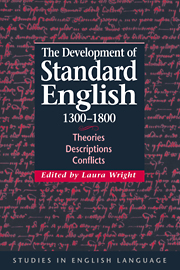Book contents
- Frontmatter
- Contents
- List of contributors
- Acknowledgements
- Introduction
- Part one Theory and methodology: approaches to studying the standardisation of English
- Part two Processes of the standardisation of English
- 7 Standardisation and the language of early statutes
- 8 Scientific language and spelling standardisation 1375–1550
- 9 Change from above or from below? Mapping the loci of linguistic change in the history of Scottish English
- 10 Adjective comparison and standardisation processes in American and British English from 1620 to the present
- 11 The Spectator, the politics of social networks, and language standardisation in eighteenth-century England
- 12 A branching path: low vowel lengthening and its friends in the emerging standard
- Index
7 - Standardisation and the language of early statutes
Published online by Cambridge University Press: 30 September 2009
- Frontmatter
- Contents
- List of contributors
- Acknowledgements
- Introduction
- Part one Theory and methodology: approaches to studying the standardisation of English
- Part two Processes of the standardisation of English
- 7 Standardisation and the language of early statutes
- 8 Scientific language and spelling standardisation 1375–1550
- 9 Change from above or from below? Mapping the loci of linguistic change in the history of Scottish English
- 10 Adjective comparison and standardisation processes in American and British English from 1620 to the present
- 11 The Spectator, the politics of social networks, and language standardisation in eighteenth-century England
- 12 A branching path: low vowel lengthening and its friends in the emerging standard
- Index
Summary
Introduction
The rise of standard language is closely connected with increasing literacy and the wide distribution of written texts representing various genres with various functions. In the present paper I shall discuss the influence of a highly specific genre, statutory texts, on the early development of the written English standard in Late Middle and Early Modern English. My survey begins with the reintroduction of English in the fifteenth century; unfortunately space does not permit a discussion of the role played by Old English legal texts in the developing standards before the Norman Conquest.
Discussion of the rise of the standard has so far mainly concentrated on the gradual fixation of English orthography and the loss of variant spellings. This is quite natural as spelling variants, at least to a certain extent, give information on dialectal pronunciations. Furthermore, the monumental Linguistic Atlas of Late Mediaeval English has given great impetus to the systematic study of spelling in fifteenth-century English.
It is obvious, however, that the time has come to shift the focus of interest from spelling variants to other linguistic features. As Laura Wright points out in her insightful article about the evolution of Standard English:
Most of all, we cannot claim to have identified and understood a process of standardisation until we have treated not only spelling, but also morphology, vocabulary, phonology, and syntax. The evolution of the written sentence is one of the most central developments of standardisation, along with the process of making external contexts explicit. Until we have understood the development of such constituents, the story of the evolution of Standard English remains to be told.
(1996: 113)- Type
- Chapter
- Information
- The Development of Standard English, 1300–1800Theories, Descriptions, Conflicts, pp. 117 - 130Publisher: Cambridge University PressPrint publication year: 2000
- 17
- Cited by



